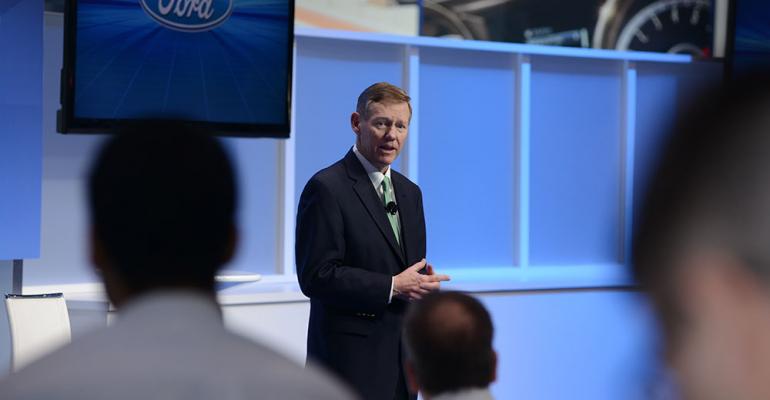DETROIT – Chief Operating Officer Mark Fields has taken over most of Ford’s day-to-day operations, leaving CEO Alan Mulally to focus on other tasks, including planning the long-term future of the automaker.
Determining the future of mobility, and ensuring Ford plays a role in it, is high on Mulally’s list.
The number of multimillion-resident cities is on the rise, particularly in emerging countries, and the executive says traditional modes of transportation may not be the best fit for such metropolises.
“We work with all the major cities around the world and all the places we operate to understand where they are going to go to create cities that really work for people,” Mulally says during the North American International Auto Show here.
“Personal mobility is going to (entail) integrated system solutions, whether it includes cars or other types of transportation.”
The initiative is similar to the one discussed by Ford Chairman Bill Ford Jr. during the 2008 auto show that he dubbed the “Mega-Cities” project. He cautioned then against assuming the automaker always would be in the car business.
“We’re going to be in the transportation business, and it’s going to look very different 20, 30 or 50 years from now,” Bill Ford said at the time.
Mulally does not disclose what types of transportation Ford is researching, but notes a system in Hong Kong that incorporates rail and water travel. He also mentions car-sharing as a possible solution for the future.
“It’s too early to project (what forms of transportation will be used in future mobility,)” he says. “But we do know we want to be part of the solution. And then that will be something we look at from a business point of view and decide which areas would make sense for us to contribute.
“What we’re really trying to do is provide personal mobility,” Mulally says. “Are (personal cars) the right way to do it, or is it better to have more mass transit and other forms of transportation?”
Some pundits have brought up autonomous vehicles as a way to relieve urban congestion, but Mulally, who worked for decades in the aviation industry where autopilot technology is prevalent, says such systems for automobiles are not quite ready.
“We’re not at the place with sensors and algorithms that we can predict every situation that a vehicle can get into,” he says. “That’s why pilots are always ultimately responsible, and I feel the same way about cars.
“Do I see a day someday where we’ll see more automation? Absolutely,” Mulally says. “But we need to keep working with everybody, including the regulators, the liability and insurance companies, and work with sensor sets to get the costs down.”




